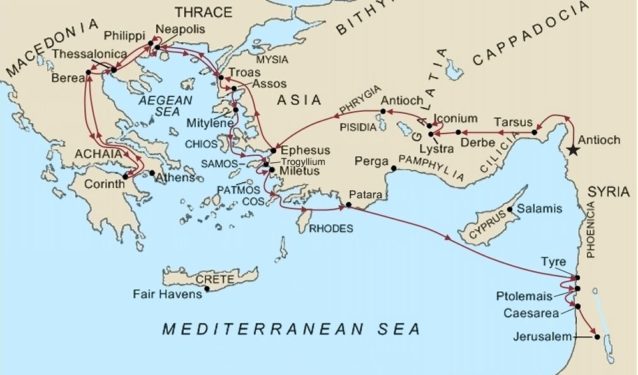Readings
- Acts 19
- 1 Timothy 1:1-7
- Revelation 2:1-7
Prayer
Pray… that you would be willing to “teach what you affirm” – i.e. that if you agree with the words we’re reading, that you would share the message.
Day 344 – Paul – Journey #3 (Ephesus)
The story of the church at Ephesus through scripture

- You might have thought, understandably, that a day of readings about Ephesus would include readings from the book of Ephesians. Today’s readings, as you’ll have seen, don’t. You may have studied parts of Ephesians before. It is chock-full of wonderful scriptural encouragement and truth. If you have read any of it before, I wonder if it’s helped your understanding of that letter by reading a little more about the church and the city itself.
- The first 22 verses of Acts 19 give us an insight into some of the different things which were going on at the time. You’ll notice that God worked miracles through Paul in ways He doesn’t in today’s post-apostolic days. “Post-apostolic” means any time after the original apostles lived. From these verses, can you pick out one or two difficulties that Paul had as he preached that we don’t have today?
- What happened during the riot in Acts 19:23-41? How was the riot started (verse 23 onwards)? Was the riot caused by people who had a deep religious concern about Paul, or was it about greed?
- It’s very easy to “go along with the crowd”, as today’s story demonstrates. Have you ever shared something about this Bible reading course, or your faith, online, such as on Facebook? Doing so is sometimes hard. You have to step out of the crowd and make yourself vulnerable. Many of the people in this crowd went along with what everyone else was doing, not because they agreed, but because they didn’t want to stand out. Acts 19:32 says it all, really.
- Challenges in living as a Christian come in many different guises. Our church was redeveloped a few years ago. When we did all that hard work, taking out the pews and so on, the challenges were technical and financial. Now that that has been done, and we’ve moved in the building, there are new challenges: using the space to share the gospel, and even to encourage people who were opposed to the changes. Paul’s initial difficulties were with misunderstandings (Acts 19:2) and rioters. In the letter to Timothy, written many years later, what are the new challenges that need dealing with in Ephesus? Focus on verses 3-7.
- Our brief dip into Revelation showed us one of seven letters that was written to historical churches. We’ll read more about these letters on day 354. The letter to the church in Ephesus is split into three sections: encouragement, concerns or complaints, and then words of advice or correction. What are the words spoken by Jesus to the church at Ephesus?
There were plenty of issues that needed to be worked through in Ephesus, weren’t there? I expect this is was a picture of many cities though, which would have struggled to accept the good news about Jesus, and then later would have problems faithfully teaching it.
As I mentioned in my notes, one of the initial challenges Paul had was to convince the crowds about the truth of his words. For two hours, he had to stand and wait whilst the crowd tried to shout him down (Acts 19:34). The unrest was started by a few people with a financial concern related to false gods, and it turned into a riot of which many people had little understanding. They joined in because other people around them were doing so, and it seemed the thing to do to fit in. That’s understandable. Nobody wants to stand out as different. But today, Christians do stand out.
I once heard someone defend a decision which he had made on a certain topic. In retrospect, it was agreed that the decision he had made had been an poor one. He had made his decision because he had (incorrectly) worried that making a different decision would have offended someone from a different culture. Later, when defending the decision he made, he admitted “I’d rather be seen as an idiot than a racist”.
Now, I’d hope that the things you choose to do in life would be neither idiotic nor racist, as neither are good things. I’m not defending the right to be an idiot or a racist. The interesting thing here, rather, was that the uppermost thought in the man’s mind was that he would rather make a bad choice, than make an alternative choice which could have pictured him as a racist. He chose to make the more culturally acceptable mistake. He stood out less, even though everyone later agreed that he made the wrong decision.
My point is that sometimes people do things and say things that they might not even agree with, but they do it, or say it, to fit in. Have you ever done this? What are the difficulties you’ve come across where you’ve felt the need to say or do something that went against what the bible teaches?
Leave a Reply
You must be logged in to post a comment.